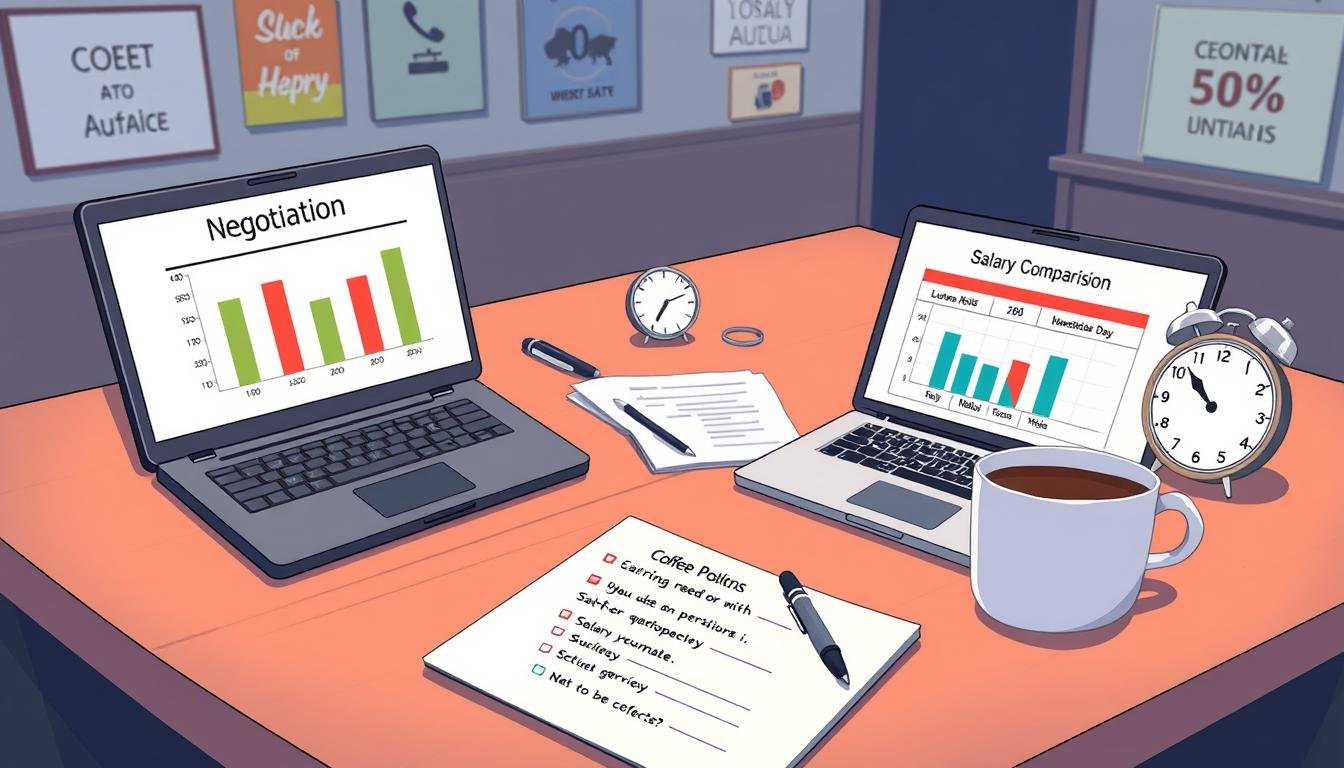Negotiating Salary and Benefits Like a Pro
Mastering salary negotiation is key in today’s job market. It doesn’t matter if you’re new or experienced. Knowing how to negotiate your pay can really change your financial future. This guide will give you expert advice to get the best deal.
Good negotiation tips include researching what others earn, showing your worth, and looking at all benefits. Remember, it’s not just about your salary. Things like health insurance, retirement plans, and work-life balance can also boost your pay.
Key Takeaways
- Research industry salary trends before negotiations
- Consider the entire compensation package, not just base salary
- Prepare a strong value proposition to support your requests
- Be confident and professional during discussions
- Get the final agreement in writing
- Don’t be afraid to negotiate – 70% of managers expect it
- Practice your negotiation skills beforehand
Understanding the Current Job Market Landscape
The job market is always changing. New trends are shaping how companies hire and pay their employees. Job seekers need to stay up-to-date to do well in negotiations and get the best pay.
Market Trends and Salary Expectations
Today, companies are changing how they hire. The 2024 Salary Guide from Robert Half shows that 51% of firms are raising starting pay to get the best talent. This gives skilled professionals a chance to ask for higher salaries.
Industry-Specific Compensation Patterns
It’s key to know the salary trends in your industry before you start negotiating. Salary guides offer insights into what different jobs and experience levels are worth. This helps candidates make smart choices during negotiations.
Impact of Economic Conditions on Negotiations
Economic factors greatly affect salary talks. With 55% of employers finding it hard to find the right talent, candidates have more power to negotiate better pay. Talking about benefits can also be a smart move, as it’s a cost-effective option for employers.
| Negotiation Factor | Impact |
|---|---|
| Skill Shortage | Increased bargaining power for skilled candidates |
| Economic Growth | More room for salary increases and benefits |
| Industry Trends | Influences compensation patterns and expectations |
By grasping these market changes, job seekers can craft effective strategies. They can aim to get fair pay that matches their skills and experience.
Essential Research Before Salary Negotiations
Getting ready for salary talks is key. Only 30% of U.S. workers try to get a better pay deal. But, 85% of those who ask get some of what they want. This shows how important it is to negotiate with confidence.
First, look up what similar jobs pay. Use sites like Glassdoor, Payscale, and LinkedIn Salary Insights. They give you data on average salaries in your field and area. This helps you know what to ask for.
- Industry norms
- Role and responsibilities
- Years of experience
- Specialized expertise
- Location and cost of living
Think about what makes you special and valuable. Have examples ready of your successes. This makes it tough for employers to say no to your salary ask.
| Negotiation Preparation | Percentage |
|---|---|
| Employees who attempt to negotiate higher pay | 30% |
| Professionals uncomfortable asking for more money | 38% |
| Professionals content with existing pay | 39% |
| Negotiators who receive at least some of their request | 85% |
Negotiation is about finding common ground. Be open to other perks if a higher salary isn’t possible. With good research and preparation, you’ll negotiate with confidence. This way, you’re more likely to get a good deal.
The Art of Benefits Package Evaluation
When you’re negotiating your salary and benefits, don’t just focus on the money. A good benefits package can really add to your overall pay. Let’s dive into the important parts to think about when you’re negotiating.
Healthcare and Insurance Benefits
Health coverage is a key part of any benefits package. Look at medical, dental, and vision plans closely. Some employers also offer mental health coverage or include it in their medical plans. Don’t forget about disability and life insurance, as they offer important financial protection.
Retirement and Investment Options
Retirement benefits are vital for your financial future. Check for 401(k) plans with employer matching, profit-sharing, or stock options. These can greatly increase your total compensation package.
Work-Life Balance Benefits
Flexible work and remote options are now very valuable. Think about how these perks fit your lifestyle and work style. Paid time off, parental leave, and wellness programs also help with a good work-life balance.
Professional Development Opportunities
Benefits like tuition reimbursement, conference attendance, or professional certification support are very valuable. They not only improve your skills but also increase your future earning potential.
Understanding all the benefits is key to negotiating well. By looking at each part, you can make smart choices and get a package that really shows your value.
| Benefit Type | Importance | Impact on Total Compensation |
|---|---|---|
| Healthcare | High | Can save thousands annually |
| Retirement | High | Long-term wealth accumulation |
| Work-Life Balance | Medium | Improved job satisfaction |
| Professional Development | Medium | Career advancement opportunities |
Timing Your Negotiation Strategy
Timing is key in salary negotiations. A study by Michelle Marks and Crystal Harold found that those who negotiated their first offer got an average of $5,000 more. This shows how important it is to know how to negotiate your pay.
The study looked at five negotiation strategies: collaborating, competing, accommodating, compromising, and avoiding. Collaborating and competing were the best for getting more pay. People who were assertive in their negotiations often got higher raises.
Here are some tips for salary negotiation tactics:
- Avoid sharing your current salary or expectations during the interview process
- Counter offer between 10% and 20% above the initial offer
- Use a specific number rather than a range when counter offering
- Prepare a well-structured email for your counter offer
Recruiters are skilled negotiators. Be prepared for a fast response to your counter offer. By timing your negotiation well and using these tips, you can get a better salary.
“Employers should allow employees room to negotiate their starting pay as this could result in a more content and productive workforce.”
Negotiating Salary and Benefits Like a Pro
Learning to negotiate salary is key for career advancement. With the right advice, you can earn more. A 2023 Pew Research survey showed that 66% of job seekers who asked for higher starting salaries got them. But, only 30% of people remembered asking for a higher salary during their last job search.
Building Your Value Proposition
To negotiate salary with confidence, show off your strengths and unique skills. Use examples of how your skills help the company. Talk about certifications or specialized skills that make you stand out.
Quantify your achievements, like lowering costs or improving client satisfaction. This will help make your case for higher pay stronger.
Effective Communication Techniques
Practice your negotiation skills with a business-savvy friend to feel confident. When talking about salary, consider these tips:
- Turn the question back to the employer
- Seek more information about the role
- Provide a salary range instead of a specific number
Negotiating in salary ranges can be more beneficial than giving a specific number.
Handling Counteroffers
Be ready for tough questions like “Are we your top choice?” Be honest and keep your negotiating power. If you get a counteroffer, think about non-monetary perks like flexible hours or extra holidays.
These can be attractive to employers and add value to your package.
| Negotiation Element | Strategy |
|---|---|
| Salary | Use anchoring technique to align closer to top end |
| Benefits | Discuss health insurance, retirement plans, vacation time |
| Work Arrangements | Propose flexible hours or remote work options |
| Professional Development | Request training or conference attendance |
By using these strategies and negotiating with confidence, you can get a compensation package that shows your true worth.
Mastering Non-Salary Compensation Elements
Looking beyond the base salary is key to getting a better job offer. Non-salary elements can greatly enhance your package and work-life balance. Let’s look at important parts to think about in your negotiation strategies.
Flexible Work Arrangements
Remote work and flexible hours are now more valuable. A study found that those with flexible schedules are happier at work. Talk about how these options can make you more productive and dedicated to your job.
Stock Options and Equity
Stock options can lead to big financial gains in the future. Research shows companies with equity compensation do better than those without. Know about vesting schedules and exercise prices to really understand the value of stock options in your offer.
Performance Bonuses
Performance bonuses can greatly increase your pay. On average, bonuses make up 11% of total pay across industries. Ask for clear goals for these bonuses to make sure your hard work is fairly rewarded.
| Compensation Element | Potential Value | Negotiation Tip |
|---|---|---|
| Flexible Work | Improved work-life balance | Highlight productivity benefits |
| Stock Options | Long-term financial gains | Understand vesting schedules |
| Performance Bonuses | 11% average of total comp | Negotiate clear metrics |
Only 37% of professionals always try to negotiate their salary. By focusing on non-salary elements, you’re already ahead in getting a better total compensation. Go into negotiations with confidence, ready with data and a clear sense of your worth.
Understanding Leave Policies and Time-Off Benefits
Leave policies are key in benefits package talks. Knowing the different leaves employers offer is vital. These include vacation, sick leave, parental leave, and bereavement leave.
Americans get ten paid leaves a year after one year of work. Sadly, they leave 768 million vacation days unused each year. It shows how important it is to use your time-off benefits.
Some companies, like Netflix, Twitter, and LinkedIn, offer unlimited paid time off. This is becoming more common as companies try to attract the best talent. Also, 78% of senior managers say their companies offer flexible work schedules.
When looking for a new job, ask for more vacation time or pay instead. Use your experience and industry seniority in these talks. It’s best to ask about benefits during the second interview or job offer.
| Benefit | Percentage of Employers Offering |
|---|---|
| Flexible Work Schedules | 78% |
| Remote Work Options | 70% |
| Paid Parental Leave | 72% |
| Paid Time Off for Volunteering | 59% |
Knowing about leave policies is key for a good work-life balance and job happiness. By doing your research and negotiating, you can get a package that fits your needs and career goals.
Developing Professional Confidence in Negotiations
Negotiating salary with confidence is key. How you present yourself can greatly affect the outcome.
Body Language and Presentation
Your nonverbal cues are very important. Keep eye contact, sit straight, and use open gestures. A firm handshake and a smile can start the conversation on a good note.
Overcoming Negotiation Anxiety
It’s normal to feel nervous. But, knowing the market rates for your role can boost your confidence. Practice your points and think about possible questions to feel more comfortable.
Building Rapport with Hiring Managers
Connecting with your potential employer is crucial. Show you’re interested in the company and the role. Share your achievements that match their needs. For example, talking about how you brought in 50 new leads can highlight your value.
| Confidence Boosters | Impact |
|---|---|
| Thorough preparation | Reduces anxiety by 60% |
| Positive body language | Increases perceived competence by 40% |
| Showcasing achievements | Improves negotiation success rate by 35% |
Confidence in salary negotiations comes from knowing your worth and being ready to share it. By mastering these skills, you’re set for successful salary talks.
Common Negotiation Pitfalls to Avoid
Mastering salary negotiation tactics is key for career success. Many job seekers make mistakes that can cost them a lot over their lifetime. Let’s look at some common pitfalls and tips to help you get the best deal.
One big mistake is not negotiating at all. Shockingly, 66% of American workers don’t negotiate their pay, which can cost them up to a million dollars over their career. Remember, employers often start with a low offer, expecting you to negotiate.
Another mistake is only focusing on salary. While it’s important, don’t ignore other benefits. Employers might offer to pay for further education or provide perks that add to your overall compensation.
| Negotiation Mistake | Potential Cost | Better Approach |
|---|---|---|
| Not negotiating | Up to $1 million over career | Always negotiate, even briefly |
| Focusing only on salary | Missed opportunities for benefits | Consider total compensation package |
| Lack of preparation | Weaker bargaining position | Research market rates and company |
Avoid giving in too quickly or taking too long to negotiate. Successful negotiators plan well, knowing their priorities and alternatives. Remember, negotiation is about solving problems, not arguing. By avoiding these mistakes and using smart negotiation tips, you can greatly increase your earnings.
Securing Your Agreement in Writing
Getting your agreement in writing is key in job offer negotiations. Expert advice stresses the need to document all terms. This step protects both sides and makes sure everyone knows their job terms.
Key Elements of Offer Letters
A good offer letter should have:
- Agreed salary amount
- Signing bonuses or moving expenses
- Detailed job description
- List of responsibilities
- Benefits package details
Legal Considerations
Know the legal side when you finalize your agreement. Some companies give you a contract right away. If not, ask for one. Always check the terms before you sign.
Timeline for Response
It’s important to respond quickly to job offers. The best time to send a salary negotiation email is after you get the offer but before you accept it. This lets you talk about terms if needed.
| Negotiation Phase | Action | Timeline |
|---|---|---|
| Receive Offer | Review Terms | 1-2 Days |
| Negotiation | Discuss Terms | 2-3 Days |
| Final Agreement | Sign Contract | 1-2 Days |
Remember, patience and timing are crucial in negotiations. By following expert advice, you can get a good agreement. This agreement will show your worth and match your career goals.
Conclusion
Mastering salary negotiations is crucial in today’s job market. In Central Queensland, salaries differ a lot in fields like construction, engineering, and healthcare. Employers may offer non-salary perks like flexible work and training opportunities.
Timing your salary and benefit requests is key. Ask for a raise after a great performance review or a big project. Remember, the first offer is not always the last, so be ready for counteroffers and know your limits.
Research is essential for good negotiations. Use sites like Glassdoor, Payscale, and LinkedIn Salary to learn about market rates. Also, think about your special skills, certifications, and achievements. This way, you’ll get a total compensation package that shows your worth.
Keep improving your negotiation skills with practice. Each time, you’ll learn more and feel more confident. Remember, mastering salary negotiations is a journey that can greatly affect your career and finances.
Source Links
- How to Negotiate Salary & Benefits
- How to Negotiate Your Salary Like a Pro | FlexJobs
- Tips For Negotiating Your Salary Like A Pro
- How to Negotiate Salary After You Get a Job Offer
- 6 Tips on Negotiating Salary like a Pro
- 7 Tips for Your Next Salary Negotiation | HBS Online
- How to Negotiate Your Salary Like a Pro
- 3 Steps to Negotiate Your Starting Salary Like a Pro | Boly:Welch
- 13 Tips for Negotiating Your Salary & Benefits Package Like a Pro
- Council Post: 20 Ways To Master The Art Of Salary Negotiation
- How to Negotiate Salary: 3 Winning Strategies
- How to negotiate salary: 9 tips from a pro salary negotiator
- 5 Tips for Negotiating Your Salary Like a Pro – Tyler Bloom Consulting
- Everything I’ve Learned About Negotiating Salary Like a Pro
- Mastering the Art of Negotiating Your Salary: 12 Proven Tips and Strategies for Higher Pay
- Negotiating Like a Pro: Mastering the Art of Physician Salary Negotiation – PhysEmp Blog
- Mastering Salary Negotiation: Unveiling the Ultimate Rule for Success
- How to Get More Paid Time Off (With Scripts) –
- Ask The Headhunter® – 2 weeks vacation time? Are you kidding?
- The Job Seeker’s Guide to Understanding Employee Benefits
- Seal the Deal: How to Negotiate Your Salary and Benefits Like a Pro
- Here’s how you can tackle salary negotiation with confidence and professionalism.
- Negotiation Strategy: Seven Common Pitfalls to Avoid
- How to Counter a Job Offer: Avoid Common Mistakes
- The do’s and don’ts of negotiating a raise
- Negotiating Your Salary Like a Pro: Learn Strategies to Confidently Negotiate Your Worth
- How to negotiate a higher salary offer via email (sample included)
- Employment Contract Negotiation – 8 Key Tips | Morgan McKinley Recruitment
- Negotiating Your Salary and Benefits Like a Pro
- Negotiating Salaries and Benefits: Mastering the Art of Compensation Conversations








